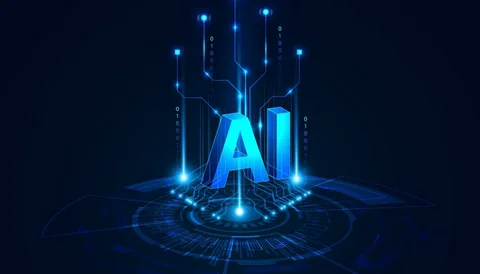Discover how technology and AI are shaping our world in 2025. From healthcare to education and beyond, explore the major impacts driving global transformation.
Introduction
The year 2025 marks a significant inflection point in the integration of technology and artificial intelligence (AI) into daily life. From reshaping industries to transforming how we communicate, learn, and manage our health, the impact of AI and tech is undeniable. What was once considered futuristic has now become foundational in almost every sector. This article explores the multifaceted impact of tech and AI in 2025, detailing their importance across various industries and the potential implications for society.
1. Healthcare Revolutionized by AI
AI has become a powerful tool in diagnostics, treatment personalization, and patient management in 2025. Machine learning algorithms can detect diseases such as cancer or Alzheimer’s in early stages with greater accuracy than ever before. Robotic surgeries, enhanced by real-time data and AI precision, minimize human error and improve recovery times. Telemedicine, powered by AI triage systems, allows rural and underserved populations better access to medical care.
Key Examples:
- AI chatbots provide 24/7 medical advice.
- Wearable health tech monitors vitals and alerts users of anomalies.
- Predictive analytics in hospitals reduce patient readmission rates.
2. Education Personalized and Globalized
In 2025, AI and technology have democratized access to education. Intelligent learning platforms adapt in real-time to each student’s pace and style of learning. Virtual classrooms are no longer experimental; they are mainstream, supported by immersive technologies like augmented reality (AR) and virtual reality (VR).
Key Examples:
- AI tutors provide individualized feedback and performance analysis.
- VR history classes allow students to explore ancient civilizations.
- Language-learning apps use AI to mimic conversational partners.
3. Transportation and Autonomous Mobility
Self-driving cars are no longer prototypes; they’re on the roads, integrated with smart city infrastructure. In 2025, AI has optimized routes, reduced traffic congestion, and significantly decreased traffic-related fatalities. Logistics has also transformed, with autonomous delivery drones and vehicles streamlining last-mile delivery.
Key Examples:
- AI-powered ride-sharing reduces wait times and emissions.
- Public transport systems adjust routes based on real-time demand.
- Smart traffic lights manage urban flow using predictive algorithms.
4. Business and Workplaces Transformed
From recruitment to operations, AI reshapes how businesses function. AI-driven analytics help companies forecast market trends and customer behavior. Robotic Process Automation (RPA) handles repetitive tasks, allowing human workers to focus on strategic initiatives. Remote work has matured, supported by AI collaboration tools and virtual offices.
Key Examples:
- AI resumes screeners help HR identify top candidates.
- Digital twins model and optimize business operations.
- AI chatbots handle customer service inquiries efficiently.
5. Financial Services and Smart Banking
AI has become integral in fraud detection, risk assessment, and investment strategy. In 2025, financial institutions offer hyper-personalized banking experiences. AI advisors suggest investment opportunities based on real-time market analysis and personal goals.
Key Examples:
- AI credit scoring models improve loan accessibility.
- Chatbots provide 24/7 financial advice.
- Blockchain tech ensures secure, transparent transactions.
6. Environmental Monitoring and Sustainability
AI-driven systems in 2025 track and manage environmental data to combat climate change. Smart agriculture uses AI to optimize crop yields while reducing resource usage. Energy grids, powered by AI, predict consumption and adapt to renewable sources like solar and wind.
Key Examples:
- AI drones monitor deforestation and wildlife activity.
- Smart irrigation systems save water and improve farming efficiency.
- Predictive maintenance reduces industrial waste.
7. Cybersecurity and Digital Ethics
With tech advancement comes the challenge of cybersecurity. In 2025, AI defends against cyber threats by identifying suspicious patterns before they escalate. Simultaneously, concerns about data privacy and algorithmic bias have led to stronger regulatory frameworks.
Key Examples:
- AI-powered firewalls adapt to new types of malware.
- Ethical AI boards oversee fair use of algorithms.
- Biometric authentication replaces traditional passwords.
8. Entertainment and Media Experiences Enhanced
AI curates personalized content across streaming platforms, news feeds, and social media. In gaming and film, AI-generated environments and characters bring unprecedented realism and engagement. Creators use AI to assist with editing, scripting, and even music composition.
Key Examples:
- Personalized playlists and viewing queues.
- AI-generated art and music.
- Virtual influencers and holographic concerts.
9. Smart Homes and IoT Integration
2025 homes are intelligent ecosystems. AI assistants coordinate lighting, temperature, security, and entertainment. IoT devices across appliances share data for convenience and efficiency. The smart home is a central hub of comfort and automation.
Key Examples:
- Fridges suggest recipes based on contents.
- AI security systems recognize familiar faces.
- Voice-controlled everything, from lighting to vacuuming.
10. Social Impact and Human-AI Collaboration
AI’s influence on society is vast. It helps tackle inequality, improve public services, and manage crises. In 2025, AI collaborates with humans, not replaces them. The synergy leads to greater productivity, innovation, and societal advancement.
Key Examples:
- AI aids in disaster response and relief planning.
- Predictive models support social policy design.
- AI translators bridge communication gaps in global communities.
Conclusion
Technology and AI are not just tools in 2025; they are co-creators of the future. Their importance lies in how they empower humanity to solve complex problems, improve quality of life, and explore new possibilities. While challenges remain—from ethical considerations to equitable access—the trajectory of tech and AI points toward a smarter, more connected, and sustainable world.
In essence, the impact of tech and AI in 2025 is monumental, defining how we live, work, and relate to one another. The next frontier lies in ensuring that this transformation benefits all, leaving no one behind.

